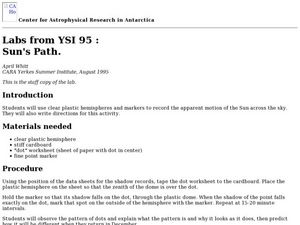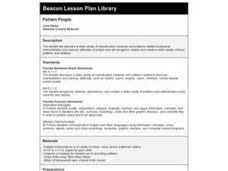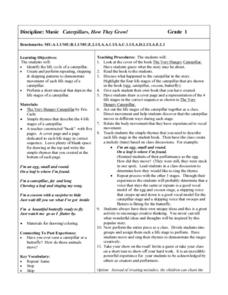Urbana School District
Fluids
In 1879, Sir William Crookes discovered the fourth state of matter, plasma. The presentation covers states of matter, phase changes, density, pressure Pascal's Principle, buoyant force, Archimedes' Principle, Bernoulli's Principle,...
Curated OER
Anatomy of a Bone - Coloring
Clarify and color code the anatomy of a bone with this resource. This worksheet lists 7 parts of a bone along with a definition for each part. Learners read through this information and color in each part of the bone a listed color. They...
Curated OER
Periodic Table Patterns using Fabulous Periodic
Students explain how elements are arranged in the periodic table. In this chemistry lesson plan, students group the eggs according to a certain pattern. They compare this to elements in the periodic table.
Curated OER
The Function Box
Students look around classroom and identify any patterns they see, describe patterns and explain why they are patterns, use pencil to demonstrate arithmetic patterns by tapping, practice predicting patterns by using Function Box, and...
Curated OER
Classroom Idea: Clap Along
Students study patterns. In this math lesson, students repeat a pattern that has been clapped out by the teacher. Actions can be added to increase difficulty level.
Curated OER
Let Us Be Sensible
Students describe the five senses. They perform an investigation using sensory organs associated with each of the senses. Students identify, describe and extend repeating relationship (pattern) found in common, objects, sounds and...
Curated OER
Star Gazers
Students research stars, constellations, planets and galaxies including names, shapes, sizes, colors, patterns and ages. They suspend the stars and planets from the ceiling and change monthy to display the various constellations. As a...
Curated OER
Sun's Path
Students explore the movement of the sun across the sky. In this science lesson, students use clear plastic hemispheres and markers to record how the sun moves across the sky. Students write directions so the activity could be repeated.
Curated OER
How Many Cells Are Born in a Day?
Learners predict the number of cells after a series of cell divisions. In this cells lesson students create a graph of their results and create a patterned drawing.
Curated OER
Look At Those Leaves!
Students explore botany by researching plants in class. In this tree identification lesson, students examine a group of leaves and list the different characteristics before guessing what types of trees they came from. Students read about...
Curated OER
Leaf Identification
Students identify different leaf types. They examine their patterns, shapes and colors. They complete a worksheet to end the lesson.
Curated OER
Birthday Moons
Students find the phase of the moon on the date of their birth. In this science lesson, students chart the moon from the date of their birth till they were one month old. Students fill out a graphic organizer after visiting a...
Curated OER
It Looked Like...
Second graders listen to a read aloud of Charles Shaw's, It Looked Like Spilt Milk. They complete an art activity in which they spill white paint on blue paper and fold it to make a design. They write about their design following the...
Curated OER
Why Is Evolution Controversial?
Students explore why evolution has always been a controversial topic. They use scientific process to determine patterns and to critically analyze alternative explanations for natural phenomena.
Curated OER
Build An Island
Young scholars explore erosion. In this science lesson, students build an island and observe the effects of erosion on the island. Young scholars discuss freshwater ecosystems in Hawaii.
Curated OER
Types of Behavior: Animal Behavior Research
How does one determine what influences animal behavior; Is it nature or nurture? After a short reading explaining different types of conditioning and other learned behaviors, scholars examine six scenarios to determine whether the...
Curated OER
Pattern People
Students describe a wide variety of classification schemes and patterns related to physical characteristics and sensory attributes of people. They recognize, extend and create a wide variety of those patterns and relations.
Curated OER
Science: The Water Cycle
Students examine the various stages of the water cycle. In groups, they complete a hands-on activity by creating model water cycle. Students design posters representing each of the seven stages of the water cycle.
Curated OER
Science: Water States
First graders investigate the various forms of water. They discuss the properties of water. They discover examples of water's various states and locate other solids, liquids, and gases in their homes.
Code.org
Text Compression
The second lesson in a unit of 15 introduces pupils to text compression. The class begins with discussing how they already use text compression when sending text messages. Pairs learn more about the subject as they work to compress a...
Curated OER
Gumdrop Crystal Models
A great way to learn about molecular structures is to make a model. Gumdrops and toothpicks are used to construct crystal models. The models are based on theories of crystal shapes that occur because of positive and or negatively charged...
Curated OER
Music: Caterpillars, How They Grow!
Put on some music and get moving as a way to represent the life cycle of a caterpillar. Kids listen to the story The Very Hungary Caterpillar, discuss the life cycle, then create vocal expression that represent each stage of the cycle....
Curated OER
Changing Energy: Landforms and Dance
Third graders choreograph a dance to represent the changes in nature. In this dance and nature lesson plan, 3rd graders use sharp quick movements to demonstrate changes.























